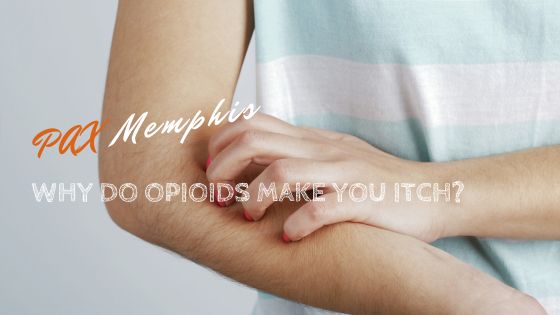Opioids have been used for hundreds of years because of their pain-relieving properties, but they are highly addictive and cause a variety of unwanted side effects. One of the more bothersome side effects of opioids is itching, or “opioid-induced pruritus.” Whether you have been prescribed opioids after surgery or you have been abusing them illicitly, you may be wondering why opioids make you itch and if there is any way to stop the itching.
What is Opioid-Induced Pruritus?
Itching is a common and well-documented side effect of opioid use. This itching, often referred to as “opioid-induced pruritus,” can range from mild irritation to intense discomfort. It typically presents as an itching sensation on the skin’s surface, and in some cases, it can be accompanied by redness or a rash.
Opioids are a class of drugs that include prescription painkillers like morphine, oxycodone, and hydrocodone, as well as the illicit drug heroin. They work by binding to specific receptors in the brain and spinal cord, known as opioid receptors, which play a crucial role in pain modulation and reward pathways. However, these receptors are also present in other parts of the body, including the skin, which is where the itching sensation originates.
If you see someone who has been taking opioids for one reason or another and you observe them itching more than normal, they may be experiencing opioid-induced pruritus.
Why Do Opioids Make You Itch? The Science Behind the Itch
The exact mechanism behind why opioids cause itching is still not fully understood, but scientists and medical professionals have introduced several ideas to explain the phenomenon. Some of the most widely accepted theories are:
1. Central Nervous System (CNS) Activation and Increased Histamines
Opioids affect the central nervous system (CNS) and may lead to the release of histamines. Histamines are compounds involved in the body’s immune response and play a key role in allergic reactions. When histamines are released, they can cause blood vessels to dilate and trigger itching. This histamine release is thought to be one of the primary drivers of opioid-induced itching.
2. Peripheral Activation of Opioid Receptors
In addition to affecting the CNS, opioids can also interact with peripheral opioid receptors that are found in the skin and other tissues. These unique interactions may trigger the release of certain substances that promote itching. The activation of peripheral receptors is believed to contribute to the localized itching on the skin that is experienced by many opioid users.
3. Individual Variation, Genetics, and Susceptibility
Not everyone who takes opioids will experience itching, and the severity of itching can vary widely among individuals. This is because genetics are thought to play a role in determining a person’s susceptibility to opioid-induced pruritus. For example, some people may have genetic factors that make them more prone to histamine release or heightened sensitivity to opioids, increasing their likelihood of itching.
4. Type of Opioid Taken and the Dose
The specific opioid drug that you take and its dosage can influence the likelihood and severity of itching. Some opioids, such as morphine and codeine, are more likely to cause itching than others. Higher doses of opioids are also more likely to induce itching, as they may lead to a stronger activation of opioid receptors in the skin and CNS. As a result, people who abuse opioids by taking higher doses may be more likely to experience itching than people who take their dose as directed. Similarly, stronger opioids like heroin and fentanyl are largely linked to itching.
How to Prevent Opioid-Induced Itching
If opioids are making you itch, it’s important to practice precautionary measures. This involves taking the lowest dose possible and taking your medication exactly as it is intended. If you are not following your doctor’s instructions by taking a higher dose or taking a dose more frequently, you’re not only increasing the risk of pruritus but also increasing the risk of physical dependence and addiction.
For those who have been prescribed opioids, you can speak to your doctor about taking an antihistamine medication. Some antihistamines can reduce opioid-induced pruritus. However, you shouldn’t do so without consulting with your physician. Many antihistamines have sedative properties, and when combined with opioids may cause sedation.
Additionally, topical creams or ointments containing hydrocortisone or other anti-itch ingredients can be applied to the itchy areas of the skin. These products can provide localized relief and soothe the itching sensation. It is also advised to consult with your doctor before using these products.
If your itching is severe and you are taking your prescription as directed, you may consider asking your doctor to try a different medication. There are many different opioid medications, each of which has varying side effect profiles. Switching to new medication may relieve itching.
Always contact your doctor if itching is severe or begins affecting your breathing.
Get Help for Opioid Abuse and Addiction Today
Opioids are powerful tools for pain relief, but they can also be highly addictive and dangerous when abused. If you or someone you love are addicted to opioids, it’s crucial to seek help at the first sign of a problem. Continuing to use opioids may have detrimental effects on your mental, emotional, and physical health, but early treatment can help you turn your life around.
At PAX Memphis, our compassionate addiction counselors are available 24 hours a day to answer your questions, assess your needs, and help you find the right opioid rehab program for you. Don’t wait any longer for the help you deserve. Please contact us today to get started.
References:
- Wiley Online Library: Mechanisms and treatment of opioid-induced pruritus: Peripheral and central pathways, Retrieved September 2023 from https://onlinelibrary.wiley.com/doi/full/10.1002/ejp.2180
- National Library of Medicine Clinical Trials: Effect of long-acting antihistamine on opioid-induced pruritus: A double-blind placebo-controlled study, Retrieved September 2023 from https://classic.clinicaltrials.gov/ProvidedDocs/55/NCT01825655/Prot_SAP_000.pdf
Medically Reviewed: September 25, 2019

All of the information on this page has been reviewed and verified by a certified addiction professional.










